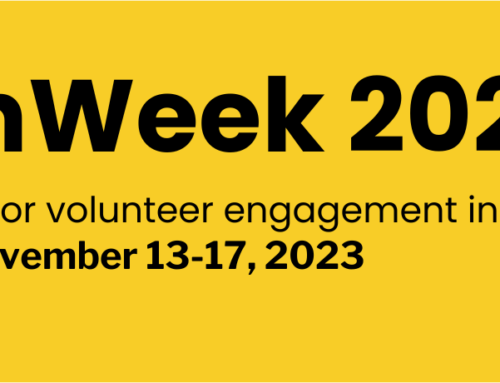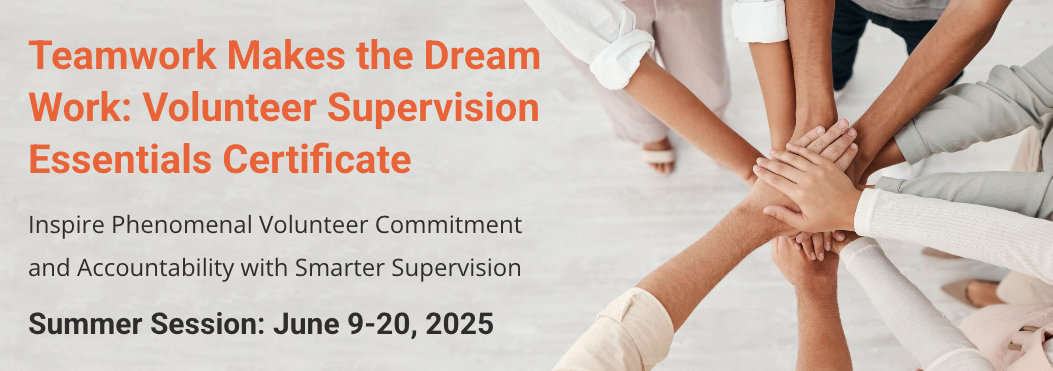
All You Need to Know for Successful Volunteer Leadership Development
We’ve all heard the term natural-born leader, but research suggests only one-third of leadership traits are genetic. This is good news for volunteer managers looking to harness volunteer passion to lead projects and move your nonprofit forward.
While most leadership skills are learned gradually through life, you can accelerate that learning curve by implementing volunteer leadership development. With almost 70% of capacity to work with, it’s time to start identifying those potential volunteer leaders today!
Read on to learn how to pinpoint volunteers who have leadership boots to fill, what mindsets limit volunteers from stepping up, and how to encourage volunteers to shine!
How to Identify Potential Volunteer Leaders
Remember Context
Context is probably the most important thing to remember when identifying potential volunteer leaders for development. Think about that Einstein quote: “Everybody is a genius. But if you judge a fish by its ability to climb a tree, it will live its whole life believing that it is stupid.”

He’s talking about smarts here, but it works the same way with most areas of life. Each of your volunteers has different talents and abilities. So, when you’re on the lookout for potential leaders, first think about what you need to accomplish, identify the best personality traits to get you there, THEN start your search for volunteers who match that criteria.
An extroverted leader might be well-suited for helping recruit new volunteers. Whereas an introverted leader may be better equipped for mentoring new recruits one-on-one. Leadership is not one-size-fits-all.
Observe Work Ethic
Watch your volunteers day-to-day. Who meets deadlines consistently? Who takes initiative on new projects? Who owns up when they make a mistake? Who lends a helping hand when others need help?
Answering this question will point out the potential leaders in your volunteer corps.
Determine Motivation
There are six distinct research-based motivations of volunteers. We’ve covered this topic in other articles (1, 2) and in our live masterclasses, so we won’t go deep here. For purposes of volunteer leadership development, you’ll want to determine which of your volunteers are doing so for altruistic or social reasons. Research has shown that these specific motivations correlate to higher chances of volunteer leadership.

Ask Their Peers
If you think a certain volunteer might benefit from volunteer leadership development, start asking their peers who they think might be a good fit for your leadership position. Chances are, they will name the volunteer you have in mind.
Challenge Them
Develop a short project that showcases the leadership traits you’re looking for. Put your volunteer in charge and see how they do. If they excel, you have your leader.
Let them Tell You
A good start to fostering volunteer leaders is to help them identify their own strengths and motivations. This can help tee up volunteers for leadership growth and increasing responsibility by making them aware of the skills they already have in place to succeed.
Check out these three self-assessment tools: Leadership Motivation Assessment, Leadership Skills Assessment, Competencies Assessment. Have your volunteer take these tests and go over the results together. Talk with them about how comfortable they would be with integrating some related leadership responsibilities into their volunteer duties.
Limiting Mindsets that Hold Potential Leaders Back (and How to Fix Them)
Some volunteers may show the exact qualities you need to lead a specific project and at the same time, exhibit some limiting mindsets. Working to identify and shift these mindsets can save you trouble in the long run.

Controlling Mindsets
When a volunteer feels like they cannot delegate tasks to other volunteers or feel personally responsible for every situation and decision, this is considered a controlling mindset. Encourage your volunteers to shift this mindset through team building exercises.
Pessimistic Mindsets
A pessimist’s world view colors every aspect of their life. Thankfully, optimism (like leadership) has been found to be a learned trait. Encourage the practice of gratitude and positive thinking among your volunteers to shift this mindset.
Low Self-Confidence Mindsets
This limiting mindset will stop volunteers in their tracks and can often mask their leadership abilities entirely. Offering thorough training and helping your volunteer see the progress they’ve made and the skills they’ve already mastered can help shift this mindset.
The Essentials of Volunteer Leadership Development
So, how can you start implementing volunteer leadership development today? Here are a few practical steps.

Use Tenure to Your Benefit
Recruiting the right people plays a key role in long-term success. And, while you shouldn’t discredit a rookie volunteer who shows leadership potential, people who are deeply connected to your cause will be more likely to take on leadership roles.
Introduce Informal Leadership Opportunities
Invite volunteers to be informal leaders by exposing them to your strategic direction and goals and asking for their advice and input.
If you act on their input, volunteers will be more likely to take additional steps toward more formal leadership roles because they understand you view them as equals and value their feedback. It’s as simple as that.
Train through Team Building
It also helps to provide some kind of team building training for your volunteers. Research shows the presence of training will impact how much your volunteers seek out volunteer roles.
Train on the Job
This might be the most difficult but most important volunteer leadership development tactic. Research shows that off-site, fabricated leadership training usually results in participants retaining 10% of what was learned. So, you can’t really expect your future volunteer leaders to hit the ground running after training.
Instead, try to turn every new project into a leadership development opportunity. Make sure the outcome simultaneously has real impact on your nonprofit and provides a significant learning experience for your budding leader.
How Will You Get Started?
Because leadership is mostly a learned endeavor, you have plenty of opportunities to set the stage for leaders to step up. All it takes is a little forethought and planning. Which steps will you implement going forward?






